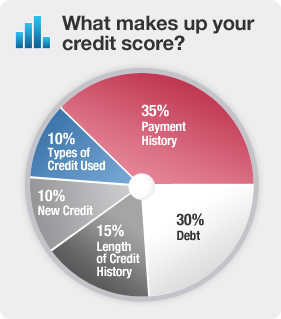 When preparing to buy a home, it pays big dividends to get your credit score in better shape before the time comes to apply for a mortgage. With a better score, you can get access to more lenders, at their best rates. That means you can have lower payments, and more house for your hard earned money!
When preparing to buy a home, it pays big dividends to get your credit score in better shape before the time comes to apply for a mortgage. With a better score, you can get access to more lenders, at their best rates. That means you can have lower payments, and more house for your hard earned money!The following steps will help you understand and improve your credit score. By applying these simple steps, you not only will show an improvement in your score, but your financial health will improve too, and that will lead to less stress and more happiness overall. By applying these steps over time, you will develop a much better financial picture, too.
1. Get Familiar With Your Credit Report
In order to improve your Credit Score, you first need to get a copy from the source. Do you know your credit score? Most Canadians do not, and most lenders won't share their findings with you, either. You can get a free copy of your credit report, called a Consumer Disclosure, by mail from the major credit reporting bureaus - Equifax and TransUnion. You can also get your credit score, but you will have to pay a small fee.
- Equifax Canada - http://www.equifax.com/ecm/canada/EFXCreditReportRequestForm.pdf
- TransUnion Canada - http://www.transunion.ca/ca/personal/creditreport/consumerdisclosure_en.page
By getting this free report annually, you can start monitoring your credit and be aware of the contents. You have to know what your score is before you can decide how to fix it.
Your credit score (or beacon score) will be a three-digit number between 300 and 900. Anything over 720 is considered excellent, and below 650 is considered poor credit. With a higher your score, you will qualify for better rates.
2. Fix Any Errors
Once you have a copy of your credit report, examine it for errors. Typical errors can include items posted for a person with a similar or identical name. If there is a legitimate mistake, getting it removed by the credit agencies can improve your score substantially.
Some things to watch are payments reported as being paid later than they were or items that were paid and not showing as paid on the report. If you find an inaccurate item, then contact the creditor for a update or removal request. Ask to get written confirmation from the creditor stating that it was an error. You may need the letter if the item isn't removed in a timely fashion, or still shows with another bureau. Then, you will have proof of the mistake, and can send it to the bureau, or show it to a lender. If you report an error to the bureau, they will then investigate the matter with the creditor and update the file.
3. Reduce Your Debts
 A big part of your credit score is set by your debt-to-available credit ratio. A good rule of thumb is to keep your account balances at 30 percent or less of your available credit. One way you can do this by paying down your credit cards or store cards with the highest balance first. If you have one card with a high balance and others with lower balances, you might consider switching some of the balance from one card to less used one. Try to avoid opening more credit card accounts to spread out the debt balances. That may show an irresponsible trend with credit you already have that you need more, and might lower your score.
A big part of your credit score is set by your debt-to-available credit ratio. A good rule of thumb is to keep your account balances at 30 percent or less of your available credit. One way you can do this by paying down your credit cards or store cards with the highest balance first. If you have one card with a high balance and others with lower balances, you might consider switching some of the balance from one card to less used one. Try to avoid opening more credit card accounts to spread out the debt balances. That may show an irresponsible trend with credit you already have that you need more, and might lower your score.4. Pay on Time
The biggest factor of your credit score is your history of on-time (or untimely) payments. Ensure that you pay ALL of your bills on time. Setting up reminders on your computer or phone can help, as can automatic payments with your bank.
5. Be diligent
While all of these steps are important, you have to be consistent. It can take several months or more to see real improvement in your credit score. Over time, all of these things will show an improvement. You need to use your credit, too. Just having a credit card, but having no transactions on it won't help your score. Applying for new credit won't help either. Each new credit inquiry can cost your credit score between 1-5 points according to the bureaus.
Using a Mortgage Agent when it comes time to apply for that mortgage will also help, as you only need to apply once. Applying at several lenders individually will hurt your score. Once you are approved for a mortgage, don't assume that you are finished. If you go out and make a number of large credit purchases (like new appliances or furniture for your new home), you may find that your credit score has dropped, and the lender won't forward the funds at closing time.
About the Author:
John Owen is a licensed Realtor and Mortgage Agent based in Oshawa, Ontario and serving the Durham Region and Toronto areas. As an independent Mortgage Agent, he can help you secure the best possible mortgage rates and terms by having lenders compete for your mortgage business, all at no cost to you!



Comments:
Post Your Comment: